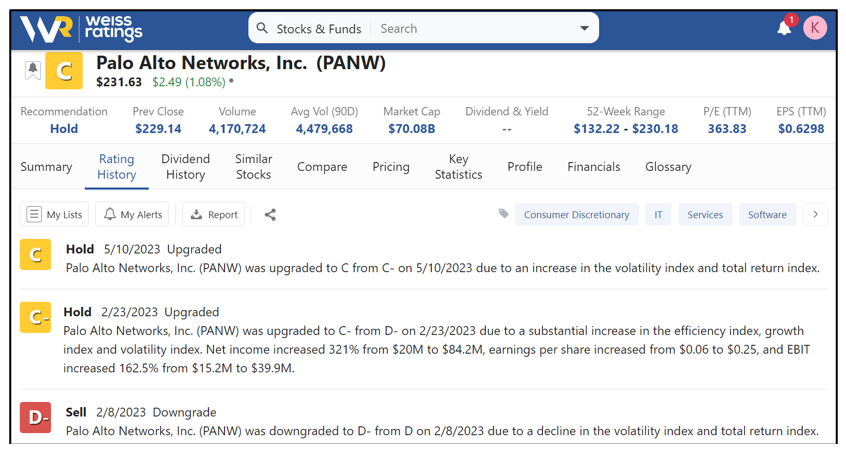Hacker-Created AI Is No Stranger to This Cybersecurity Pioneer
 |
| By Karen Riccio |
Happy Cybersecurity Awareness Month again!
In last week’s article, I addressed how the use and misuse of Open AI’s ChatGPT by 100 million-plus people over just two months is setting the stage for a cybersecurity nightmare.
However, on the flip side of the coin, AI is also creating surging new revenue streams for companies fighting on the front lines of the ongoing cyberwar.
After all, it’s just a matter of time before more AI-based apps burst onto the scene — some prematurely — making cybercrime prevention and detection increasingly complex and an absolute necessity.

Market research firm IDC estimates that global cybersecurity spending could increase 12% in 2023 to $219 billion as compared to last year. IDC also expects that global cybersecurity spending could cross $300 billion by 2026.
So, as promised, I’ll share the name of a company that stands to gain the lion’s share of the market in just a moment.
It’s one of my long-time favorites with roots as a pioneer in “firewall” network and cloud security and is already being touted as a leader in creating solutions for thwarting AI-based crime.
Let’s Hear It from an Expert
First, let me reintroduce you to a friend and IT industry peer of mine, Bill Kleyman. To refresh your memory, Bill is a board member and investor in the startup, Neu.ro Inc., an AI infrastructure company using machine learning and deep learning to solve real-world problems for business and science.
Prior to that, he was executive vice president of Digital Solutions at Switch, the third-largest data center in the world.
He knows firsthand the challenges AI presents in the fight against cybercrime, which by the way, occurs once every 39 seconds.
We’ve already heard about individual horror stories where people use fake photos or voices to cause harm in some way, shape or form. But putting sophisticated AI tools in the hands of really bad guys can only make matters worse.
While Bill didn’t underplay the serious nature of current ChatGPT wrongdoings, he emphasized how much broader the disruption and destruction can become.
“Right now, 94% of AI-driven attacks come in through the inbox. So, these phishing attacks become even more contextualized and genuine.
“However, the real security needs, remarkably, are less around ransomware, and data breaches, and rogue USB sticks, and more about the application of these technologies. Obviously, the really scary part here is the nefarious use of these technologies by nation states, by rogue actors, lone wolves, etc.
“Some countries banned the use of ChatGPT because they’re afraid of not just this technology remembering data that is inputted, but that things might be trained against it, as well. So, they're like, ‘Is this really my data? Is there somebody trying to access it?’" Bill explained.
Today, Russia, China, Iran, North Korea, Italy, Syria and Cuba have banned the use of ChatGPT in their countries. Major companies including Apple (AAPL), Amazon.com (AMZN), JPMorgan Chase (JPM), Samsung (SSNLF) and Verizon (VZ) have restricted employees from using the tool for work or on any company devices.
“So, these are legit challenges,” Bill continued. “I mean, I'm not going to ever go anywhere and preach that there's a silver bullet to any of this. There's good monitoring, there's good AI recognition technologies, even though they're nascent. All of this stuff is new and novel. So, we’ve still got a pretty sizable learning curve.”
I sure hope that curve straightens out quickly because the cat-and-mouse game is coming to a head.
An AI Pioneer Poised to Profit
While the good guys are using AI tools to protect against cybercrime, bad guys are developing and using their versions of those very same AI tools to commit crimes.
That’s why many of the most successful cybersecurity companies were started by hackers themselves, which leads me to one of my all-time favorites: Palo Alto Networks (PANW).
The company’s founder Nir Zuk was originally a computer hacker. As a teenager, he got caught hacking into an Israeli company. Instead of calling the authorities, they asked him to join their team.
He later moved to the U.S. and in 2005, founded Palo Alto and became the principal developer of the first firewall and intrusion prevention system.
Over the years, Zuk’s knowledge and insight, continual innovative solutions and his shrewd acquisition of new and growing startups has made Palo Alto a pioneer in the industry and a profit maker for shareholders.
Just as the California-based company pioneered firewalls for network security, it’s fully immersed in its role as a leader in AI cybersecurity. In fact, Palo Alto embraced AI (and machine learning) long before they became household tools.
When CEO Nikesh Arora spoke during the company’s latest earnings conference call, he addressed Palo Alto’s foray into AI:
“We first introduced machine-learning capabilities as part of our WildFire offering seven years ago. In the ensuing years, we added AI and machine-learning capabilities across our network security portfolio, and it has been a critical driver of our innovation and differentiation in the market.”
Arora continued, “In 2020, we introduced the industry's first machine-learning-powered next-generation firewall, where machine-learning detection moved in line to prevent zero-day attacks. Since then, we have overhauled nearly all of our security subscriptions with advanced AI capabilities.”
He mentioned “AI” 32 times during that call, sparking a 7.7% jump in shares of PANW the following trading day.
Numbers for FQ3 2023 came in nothing short of phenomenal.
Revenue for the three months ending April 30 shot up 24% year over year to $1.7 billion, while EPS surged 83% to $1.10. On top of that, management increased its full-year growth forecasts for revenue, billings, free cash flow and earnings.
Revenue is on track to increase about 26% this fiscal year and it has a healthy pipeline worth $9.2 billion.
A big way Palo Alto has continued to expand its ecosystem into fresh and faster-growing markets is through acquisitions. In just 10 years, the company increased its revenue from $255 million to a whopping $5.5 billion.
With a $70.1 billion market cap, PANW’s hypergrowth has earned it a coveted spot in the S&P 500 and will replace Dish Network (DISH) in the large-cap index on June 20.
Perhaps now you can understand why I fell in love with PANW more than a decade ago, when shares traded for $56. As of this writing (through June 13), it’s up to $231 and 62% year to date.
The stock has also been upgraded by Weiss Ratings twice this year, moving from a “D-“ on Feb. 8 to a “C,” or “Hold,” on May 10.

With a cyberwar made more difficult to fight by AI, and companies spending more than ever to protect themselves, I see Palo Alto Networks continuing to thrive as the go-to cybersecurity company well into the future.
Talk soon,
Karen
P.S. Desperate governments do desperate things. And with Uncle Sam dead broke and drowning in debt, it’s easy to see why the government is pulling out all the stops to get its hands on more of your money. Including a new Fed program launching this July that will give unelected officials the power to spy on and even take control of your bank account. Bottom line: Hold on to your wallet and don’t miss Dr. Martin Weiss’ Emergency Summit to Protect Your Money from Imminent Government Attacks. Click here for more.

